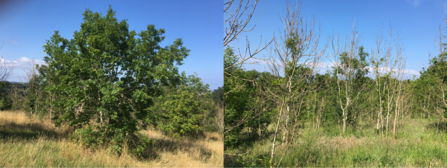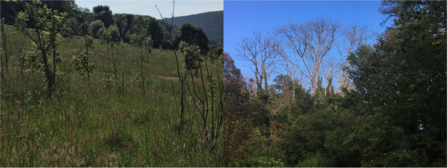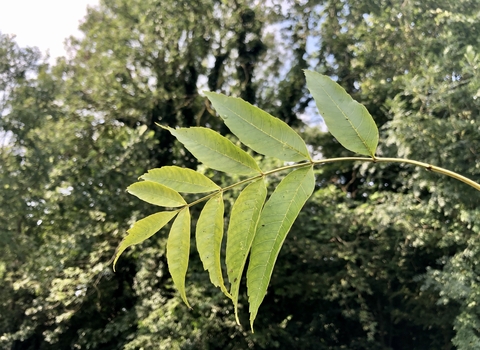The Isle of Man has hundreds of thousands of ash trees which make it our most common tree. These giants of the forest and familiar roadside trees are now threatened by a fungal disease that will gradually kill most of them. Almost everywhere on the Island you will be able to see trees that die back further every year, leaving twigs then branches to fall, before eventual death of the tree.

Left shows a healthy ash tree and right shows a group of younger trees all with the disease.
Natural resistance
The Ash Dieback was first recorded on Island in 2017 and most trees are already in gradual decline. Small saplings are the first to perish, but we are now seeing big trees starting to die. Among all this, however, you can still see some ash trees that appear to be completely fine. These trees showing tolerable resistance offer us hope that ash trees will be here for generations to come. Left their own devices the ash tree populations would recover, but it would take centuries for genetically resistant strains to dominate. There could also be some resistance to ash die-back comes from very healthy trees growing in optimal soil conditions.

Left shows young trees with ash dieback and right shows a mature tree with ash dieback.
Breeding native Manx resistant trees
Manx Wildlife Trust aims to create an orchard of resistant ash trees near Ramsey. This orchard will be created by growing selected cuttings of the most resistant trees we can find around the Island and growing them together so they can cross fertilise to create more resistant seedlings. It takes about 15 years for a young ash tree to start producing seed so this is a long-term process.
The next generation
The first generation of seedlings produced will probably still have a quite a low disease resistance, perhaps 5%. But this should still be five times better than we would otherwise expect. By growing these seeds on in open nursery conditions the seedling will become exposed to the disease and by the time they have reached two years old most of the vulnerable trees will be dead, leaving the resistant trees ready to start the second generation. Some will be planted into the wild and a select few will go on to create the second generation orchard.

